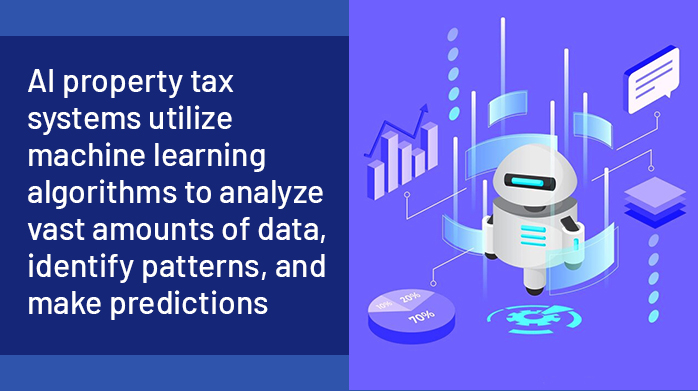In an increasingly digital world, integrating AI property tax systems are revolutionizing the way big businesses and industries handle taxation. Artificial intelligence in taxation offers numerous benefits, from improved accuracy in tax assessments to streamlined processes, leading to significant cost savings and enhanced taxpayer experience.
The Role of AI in Property Tax Systems
AI property tax systems utilize machine learning algorithms to analyze vast amounts of data, identify patterns, and make predictions. These systems can process data faster and more accurately than traditional methods, reducing the potential for human error. For example, AI can assess property values by analyzing real estate market trends, property characteristics, and economic indicators, ensuring fair and equitable tax assessments.
Enhancing Tax Preparation with AI
The integration of AI tax preparation tools is transforming the tax filing process. Traditional tax preparation can be time-consuming and prone to errors. However, artificial intelligence tax preparation systems can automatically gather and analyze financial data, identify deductions, and ensure compliance with tax laws. This not only simplifies the process for taxpayers but also reduces the workload for tax professionals.
Benefits of AI in Tax Systems
1. Improved Accuracy – Artificial intelligence in taxation minimizes errors by automating data analysis and reducing the need for manual input. This leads to more accurate property valuations and tax assessments.
2. Efficiency and Speed: AI systems can process large volumes of data quickly, resulting in faster tax assessments and refunds. This efficiency can significantly reduce the backlog of tax-related tasks.
3. Cost Savings: By automating various aspects of tax preparation and assessment, AI tax preparation systems can lower administrative costs for businesses and industries alike.
4. Enhanced Compliance: AI can help ensure compliance with tax regulations by continuously monitoring and updating tax laws and guidelines. This reduces the risk of non-compliance and associated penalties.
5. Personalized Taxpayer Experience: AI can provide personalized recommendations to taxpayers, such as identifying potential deductions or suggesting optimal tax strategies. This can improve the overall taxpayer experience and satisfaction.
Challenges and Considerations
While the benefits of integrating AI property tax systems are significant, there are challenges to consider. One of the primary concerns is data privacy and security. As AI systems handle sensitive financial and personal information, robust security measures must be in place to protect against data breaches and cyber-attacks.
Additionally, there is a need for transparency in how AI systems make decisions. Taxpayers and tax professionals must understand how these systems work to trust their outcomes. This requires clear communication and possibly the development of regulatory frameworks to govern the use of AI in taxation.
Future Trends in AI and Taxation
The future of artificial intelligence in taxation looks promising, with continuous advancements in technology driving further innovation. Here are some trends to watch:
1. Predictive Analytics: AI systems will increasingly use predictive analytics to forecast tax revenues and identify potential compliance issues before they arise.
2. Blockchain Integration: Combining AI with blockchain technology can enhance transparency and security in tax transactions, providing a tamper-proof record of all activities.
3. AI-Powered Customer Support: Virtual assistants and chatbots powered by AI will become more prevalent, providing real-time assistance to taxpayers and improving overall service delivery.
4. Advanced Error Detection: AI will play a crucial role in detecting and preventing tax mistakes by analyzing patterns and anomalies in financial data.
Property Tax Plus: Leveraging AI for Enhanced Tax Management
Property Tax Plus is a cutting-edge solution that integrates AI property tax systems to offer a comprehensive approach to property tax management. This platform utilizes artificial intelligence in taxation to streamline tax assessments, optimize tax preparation, and ensure compliance with local tax regulations. By employing AI tax preparation tools, Property Tax Plus can analyze extensive property data, identify trends, and provide accurate property valuations.
Additionally, the platform offers personalized insights and recommendations to maximize deductions and minimize liabilities. With its advanced capabilities, Property Tax Plus not only enhances efficiency and accuracy but also delivers a user-friendly experience, making artificial intelligence tax preparation accessible and effective for businesses and industries.
Integrating AI property tax systems and artificial intelligence in taxation is transforming the landscape of tax preparation and assessment. The benefits of improved accuracy, efficiency, cost savings, enhanced compliance, and a better taxpayer experience make a compelling case for the adoption of AI in tax systems. However, addressing challenges such as data privacy, security, and transparency is crucial to realizing the full potential of AI in this field. As technology continues to evolve, the role of AI tax preparation and artificial intelligence tax preparation will undoubtedly expand, driving further innovation and efficiency in taxation.







